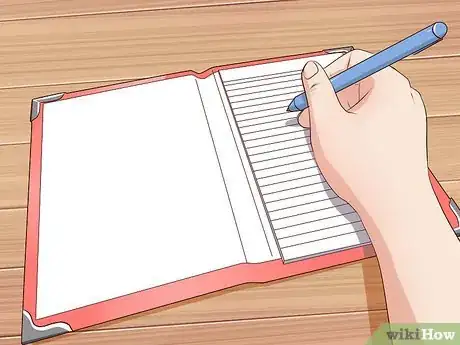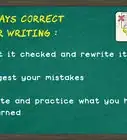wikiHow is a “wiki,” similar to Wikipedia, which means that many of our articles are co-written by multiple authors. To create this article, volunteer authors worked to edit and improve it over time.
There are 7 references cited in this article, which can be found at the bottom of the page.
wikiHow marks an article as reader-approved once it receives enough positive feedback. In this case, 94% of readers who voted found the article helpful, earning it our reader-approved status.
This article has been viewed 64,641 times.
Learn more...
English can be a challenging language to learn, but there are things you can do to make the learning process easier. Develop a healthy learning routine and improve your overall fluency by practicing both verbal and written English skills.
Steps
Part One: General Advice
-
1Set goals. Determine how fluent you want to become and set small goals that will help you gradually reach your desired level of knowledge.
- Small steps are easier to work through. For example, if learning 40 new words each month seems intimidating, tell yourself to learn 10 new words each week. The smaller goal might be easier to work toward.
- Change your goals if you need to. If your current goals are too stressful and difficult to meet, you'll become discouraged and may quit your studies as a result. On the other hand, if your current goals do not challenge you enough, you may become bored and quit your studies because of that.
-
2Schedule daily practice. Practice your verbal (listening/speaking) and written (reading/writing) skills each day. Schedule your practices for one specific time each day, and commit to studying during that time.[1]
- Tell your teacher, classmates, friends, or relatives about your schedule and ask them to check on your progress. You might feel more motivated to stick to your schedule if you're worried about the consequences of straying from it.
Advertisement -
3Study with others. Take an actual English class or find a small group of other English students to practice with. Studying the language with other people will allow you to learn from each other.
- Formal English classes work well because they are led by professional teachers. Trust your English instructor. Don't be afraid to make mistakes or ask questions; correcting you and answering those questions is part of your instructor's job.
- When learning English informally, try to work in small groups instead of large groups. Smaller crowds may make you feel more comfortable and less embarrassed.
-
4Be confident. Don't be afraid of making mistakes when you practice your English. If you stop yourself from practicing because you feel insecure about your current skill level, you won't be able to improve.
- When you don't feel confident, review the progress you've already made with your English studies. By realizing how much you've already accomplished, you might feel encouraged to continue improving yourself.
-
5Reward yourself. Learning English can be its own reward, but if you have difficulty motivating yourself, find other ways to reward yourself for reaching your short-term language learning goals.
- The reward can be related to your English studies, but it doesn't have to be. For example, you might reward yourself after reaching a major goal by visiting an international festival or other event that attracts English speakers. You might reward yourself after reaching a small goal by buying your favorite snack or visiting your favorite restaurant, though.
-
6Improve grammar gradually. At the beginning of your studies, learn enough basic grammar to express and understand meaning. Focus on learning more advanced grammar after you learn how to speak English conversationally.
- Don't worry about memorizing the rules of grammar and using each rule in every conversation or piece of writing. If you try to apply every rule of grammar, your English might seem too stiff and unnatural. Thinking about proper grammar as you try to communicate will also prevent you from conveying your thoughts quickly.[2]
-
7Keep practicing. Be patient. Learning English easily does not mean that you will learn the language quickly. Take as much time as you need to understand the language instead of trying to speed through the learning process.
- Practice consistently. If you do not study or review past lessons on a regular basis, you might forget about the information you learned. Regular practice is the only way to remember English on a long-term basis.
- Don't be discouraged about how long the process takes. No one can fluently speak or write English after only studying for a few months, and you will probably need to study for at least one or two years before you can hold conversations in English. It will probably take an even longer amount of time before your English sounds natural and fluent.[3]
Part Two: Listening and Speaking Skills
-
1Listen to English music.[4] Listen to music with English lyrics. Find a few favorite English songs and continuing listening to those songs until you understand the meaning of each one.
- If you don't know where to find English music, look for an English radio station that streams online. Check YouTube and other video websites for English music videos. Learn who some of the most popular English musicians within your favorite genre (pop music, rock music, etc.) and find several of their songs.
-
2Watch videos, shows, and movies in English. Watch the characters' actions to help yourself understand the context behind the English they speak. You can also turn on subtitles in your native language to help yourself follow along, but turn them off if the subtitles prevent you from focusing on the English words you're listening to.[5]
- Listen to English podcasts, especially podcasts designed to help people learning English as a foreign or second language.
- Watch the "Top Videos" on YouTube or other video hosting websites with English content.
- Visit websites that legally host free episodes of English shows and watch a few. Try to understand who the characters are and what the show is about.
-
3Talk to yourself. Practice speaking English when you're alone. Consider recording yourself when you speak English, then listen to that recording later.
- You can also practice singing aloud in English or reading short paragraphs of text written in English.
- Speaking in English more often can help you improve your pronunciation. Recording your spoken practices can help you identify areas you need to improve.
- Record someone who speaks English well as that person reads the same text. Listen to his or her recording, then listen to your own recording and compare your pronunciation.[6]
-
4Listen to English speakers. Travel someplace where native English speakers gather. Listen to them speak English and try to understand their conversations.
- Visiting a country where people speak English will give you more opportunity to listen to English conversation, but if this isn't an option you can consider, try visiting somewhere in your own country where English tourists gather.
- Be polite. Don't stare or make the people you're listening to feel uncomfortable, and try not to listen to every detail. Focus on identifying the general topic of each conversation and pick out several unknown words to look up later.
-
5Speak with English speakers. Find excuses to talk with others who speak English. This includes native English speakers and others who are still studying the language.
- Look for unexpected opportunities to speak English. For example, if you meet an English-speaking tourist who is lost, try to give that person directions in English.
- If possible, find several friends who only speak English and do not speak your native language. You will be forced to speak English if you want to talk with these friends.
- Become friends with others learning the language, too. These individuals might be able to sympathize with you, and you can encourage each other through the learning process.
Part Three: Reading and Writing Skills
-
1Read stories in English. Read short stories and books that are written in English. Choose these stories based on personal interest and your current skill level.[7]
- When you first start, try reading children's storybooks or materials specifically made for new English learners. These texts will use simpler English and should be easy enough to understand.[8]
- Choose written materials that interest you. It will be easier to learn if you enjoy the experience.
- After reading the text, try to summarize what happened using your own words. Identify who the characters were, what happened, why it happened, where the story took place, and when it took place.
-
2Write and read English online. Visit websites written in English and navigate through the website without translating it into your native language. Join online forums and other Internet groups that will allow you to write in English to other people, too.
- Find friends who speak English through social media websites (Facebook, Twitter, Tumblr, etc.). Visit your English friends' pages each day and try to interact based on what you read there.
- Join online forums and message boards. Choose topics that interest you and read some of the English conversations for two or three weeks. Eventually, you can start responding to discussions or starting your own discussions.[9]
-
3Look for English words in unexpected places. Check advertisements, newspapers, and other written materials for English words. Try to understand what each piece of text means and check an English translation dictionary to learn any words you do not recognize.
- If the text is pictured next to an image, use that image to help you identify the context of those English words. Look for any words written in your native language that may help provide context, too.
-
4Translate non-English text. Find a short piece of text written in your native language and translate it into English. Try to translate most of the text without using an English translation dictionary, then use your dictionary to help with the rest.
- Show the translated version to someone who reads English fluently and ask him or her to review it. If you translated it accurately, that person should be able to accurately summarize the meaning of that text in your native language. If the original meaning was lost, try to figure out where your translation went wrong and improve it.
-
5Start a journal. Write about everyday thoughts and events in a personal journal or diary. Write as much as you can without looking up the words in an English translation dictionary, but use that dictionary when do not know the correct English word for an idea you want to express.
- Start your journal by writing one sentence each day. This sentence can talk about how you feel, what you did, or what the weather was like.
- As you feel more comfortable with English, you can start writing longer journal entries that use more sentences.
Community Q&A
-
QuestionHow do I improve my English speaking?
 Alee TCommunity AnswerTo improve any language, speak it as much as you can. If you go to a shop and you hear the cashier speaking English, try to talk to him/her. You can also watch English television and listen to English music.
Alee TCommunity AnswerTo improve any language, speak it as much as you can. If you go to a shop and you hear the cashier speaking English, try to talk to him/her. You can also watch English television and listen to English music. -
QuestionHow do I speak a little bit faster and properly?
 DonaganTop AnswererKeep practicing, and copy native English speakers. See Speak English and related wikiHow articles.
DonaganTop AnswererKeep practicing, and copy native English speakers. See Speak English and related wikiHow articles. -
QuestionHow do I accumulate many English words daily?
 DonaganTop AnswererRead and listen to as much English as possible.
DonaganTop AnswererRead and listen to as much English as possible.
References
- ↑ https://www.bbc.com/worklife/article/20190219-how-to-learn-a-language-in-an-hour-a-day
- ↑ https://www.kaplaninternational.com/blog/tips-to-practice-english
- ↑ http://www.talkenglish.com/instruction.aspx
- ↑ https://voxy.com/blog/index.php/2012/01/learn-english-easy/
- ↑ https://www.kaplaninternational.com/blog/tips-to-practice-english
- ↑ http://blog.tjtaylor.net/speak-english-in-9-steps/
- ↑ https://www.englishclub.com/learn-english/learn-english-how.htm
- ↑ https://www.wallstreetenglish.com/blog/10-ways-improve-english-language-skills/
- ↑ https://www.wallstreetenglish.com/blog/10-ways-improve-english-language-skills/
About This Article
To learn English easily, start by listening to English music and watching videos, shows, and movies in English to quickly pick up words and phrases. Next, set aside time each day to practice your verbal and written English skills. You can do this on your own, but it can help to take an English class or find a small group of other students to practice with. Learn basic grammar and vocabulary first so you can speak English conversationally, then move on to more advanced grammar. For tips on setting language goals for yourself, read on!















































































